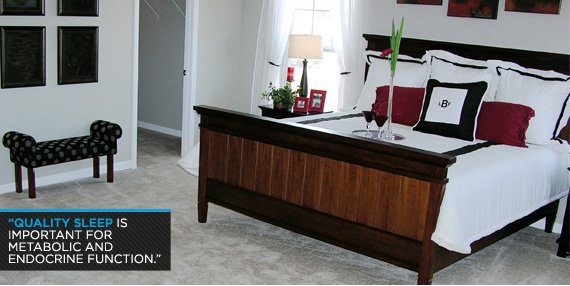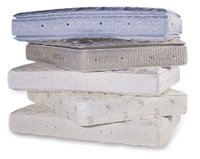Managing type 2 diabetes takes significant effort on a variety of fronts. These include watching your carb and calorie intake; working out every day or nearly every day; taking your meds, if necessary; and pricking your finger periodically throughout the day to measure your blood glucose levels.
By comparison, sleep seems like the simple part of T2D (Type 2 Diabetes) management. You lie down, doze off, and then wake up 7-or-8 hours later, feeling refreshed. No big deal, right?
It is! Americans face a chronic sleep shortage. The sleep needs of young adults have been estimated at 8.5 hours, yet only 14 percent of them report sleeping that long or more on weekdays. They're not the only ones who get shortchanged, either. A study in the American Journal of Epidemiology found that while subjects averaged 7.5 hours in bed, they were asleep for barely more than six hours.
Proper sleep is a critical aspect of managing wayward blood sugar and - as I mention in my book Sugar Nation - the area where I most often fall short in managing my own pre-diabetic condition. Quality sleep is important for metabolic and endocrine function, and research shows that not getting enough of it may be a contributing factor to obesity and diabetes. Obesity often causes obstructive sleep apnea, which in turn can further disrupt metabolic health.

Insomnia By Zzzz Numbers
Lack of sleep is also harmful to your heart, and heart disease and diabetes often go hand-in-hand. In a study of 218,155 Australian adults ages 45 and older, participants who slept six hours were at greater risk of heart disease, diabetes, stroke and hypertension than those who slept seven hours. Even one hour makes a big difference.

Shortened sleep leads to diabetes in part because it leads to weight gain. After analyzing data from the 2008 Behavioral Risk Factor Surveillance System survey, researchers found a strong association between poor sleep quality and BMI (body mass index) levels in United States adults.
Normal-weight people reported not getting enough sleep on 7.9 days over the preceding month, while those in the highest weight category reported 10.5 days of insufficient sleep.
Equally important for diabetics is the sleep-exercise connection. Exercise is essential for managing diabetes, and people who get a healthy amount of sleep may be more likely to exercise than people who do not.
When scientists evaluated the health of more than 8,000 Japanese men, they found a link between healthy sleep duration and regular exercise. Participants who banked at least seven hours per night were the most likely to exercise regularly. Likewise, people who slept less than five hours had the most irregular exercise habits.
In Search Of Sleep Solutions

How can you avoid the pitfalls of not getting the quantity and quality of sleep you need?
If your nights are filled with tossing and turning instead of REM cycles and dreams, you might be tempted to drown yourself in NyQuil.
Don't do it! These tips put you to sleep faster than Mr. Sandman on a pixie dust binge.
In a study of about 3,000 adults aged 18-to-85, getting 150 minutes per week of moderate to vigorous exercise was linked to a 65 percent improvement in quality of sleep.
These can spike your blood sugar, leading to a nocturnal crash. Your glucose-starved brain will detect this change and sound internal alarms that will wake you up. It's a survival instinct.
Turn your bedroom into a cool, dark, sleep-cave! According to the New York Times, studies have found that, in general, optimal temperature for sleep is 60-to-68 degrees Fahrenheit. As your body temp decreases, your sleepiness increases.
Are you afraid of the dark? Get over it. Todd Arnedt, director of the University of Michigan Behavioral Sleep Medicine Program, says that bright light too close to bedtime can make sleeping difficult.
Light tells your brain it's daytime instead of night, making your biological sleep clock turn off. Light doesn't frighten away closet monsters; falling asleep quickly does.

Your television, no matter how flat the screen is, does not belong in the bedroom. Cell phones, iPads, and laptops should be turned off well before you hit the sack.
A sleep study by the National Sleep Foundation found that 95% of people surveyed used some type of electronic device within an hour before bed.
Dr. Lauren Hale, one of the researchers, says that light-emitting electronic devices can suppress melatonin, making it hard to fall asleep.
Of course a giant glass of Cognac would put anyone out, but staying asleep after some serious boozing is tough. After your body processes the alcohol, sleep is often fragmented by frequent wake-ups.
Passing out from alcohol is not a healthy type of sleep; it takes hours away from your natural sleep cycle. If you must imbibe, do it at least three hours before you go to bed.

Sleeping with your spouse on a full? Napping with your butt on a spring? If your mattress isn't comfortable, sleep probably won't come easy.
Professor Michael Decker explains that lying on your body for extended periods of time reduces blood flow, which can cause pain and/or pressure. Your mattress should reduce this pressure, support your spine and cushion your whole body.
It should also be big enough for you and your partner to sleep without an elbow in the face.
— Additional reporting by Cassie Smith
References
- http://www.nytimes.com/2009/08/04/health/04real.html
- http://www.cnn.com/2010/HEALTH/08/17/how.best.sleep/index.html
- http://www.usatoday.com/news/health/medical/health/medical/story/2011/03/Glow-of-electronic-devices-is-affecting-Americans-sleep/44563394/1
- http://www.webmd.com/sleep-disorders/features/nix-nightcap-better-sleep
- http://www.webmd.com/sleep-disorders/excessive-sleepiness-10/best-mattress-good-nights-sleep

